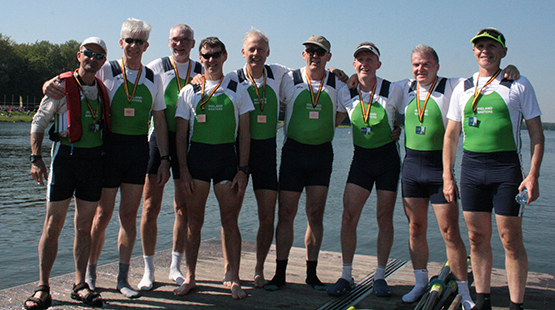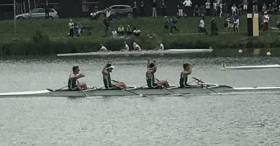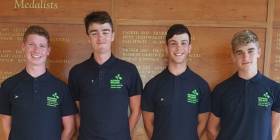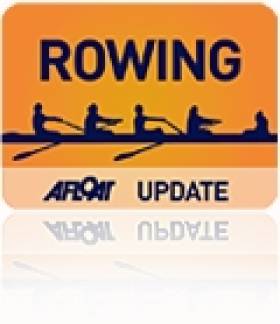Displaying items by tag: Hazewinkel
Gold for Ireland at Coupe de la Jeunesse Rowing
#Rowing: The Ireland junior men’s quadruple took a gold medal at the Coupe de la Jeunesse in Hazewinkel today. Barry O’Flynn, Matt Dundon, Jack Keating and James Quinlan had 2.42 seconds to spare over second-placed Italy at the Belgium venue. Britain took the bronze medal.
Coupe de la Jeunesse, Hazewinkel, Day One (Irish interest)
Junior Men
Four – Heat One (First Three to A Final): 3 Ireland (A Johnston, R Corrigan, B Connolly, N Timoney) 6:23.78. A Final: 5 Ireland 6:27.89.
Quadruple – Heat One: 1 Ireland (B O’Flynn, M Dundon, J Keating, J Quinlan) 6:12.81. A Final: 1 Ireland 6:12.16, 2 Italy 6:14.58, 3 Britain 6:15.07.
Junior Women
Single Sculls – Heat Two (First Three to A Final): 1 Ireland (G O’Brien) 8:10.17.
#Rowing: All the Ireland crews at the Coupe de la Jeunesse in Hazewinkel in Belgium will compete in A Finals after a very good set of results in this morning’s heats.
The Ireland men’s quadruple and single sculler Georgia O’Brien won their heats. Italy and Britain took second and third behind the quad of Barry O’Flynn, Matt Dundon, Jack Keating and James Quinlan. Britain and France followed O’Brien in, securing their places in the final.
In the men’s four, the Ireland crew of Aaron Johnston, Ross Corrigan, Barry Connolly and Nathan Timoney took third to secure qualification. They had a good second 1,000 metres. In the final 500 they went from fifth to third and beat France and Poland in the battle for an A Final spot.
The Ireland women’s pair of Eliza O’Reilly and Gill McGirr go into a straight A Final later, with six entries.
Coupe de la Jeunesse, Hazewinkel, Day One (Irish interest)
Junior Men
Four – Heat One (First Three to A Final): 3 Ireland (A Johnston, R Corrigan, B Connolly, N Timoney) 6:23.78.
Quadruple – Heat One: 1 Ireland (B O’Flynn, M Dundon, J Keating, J Quinlan) 6:12.81
Junior Women
Single Sculls – Heat Two (First Three to A Final): 1 Ireland (G O’Brien) 8:10.17.
Impressive Set of Wins By Irish at World Masters Regatta
#rowingworldmasters – Ireland had an impressive set of wins at the World Masters Regatta, the four-day event which finished today in Hazewinkel in Belgium. There was a notable win in the men’s eight in the E category (average age 55 or more) where the Irish crew beat one of Russia’s best clubs, Dynamo Moscow, by less than a canvas - .31 of a second. The strokeman of the Russian crew, Vitali Eliseev, stroked the World Championship-winning four in 1981. The Irish crew was a composite of Old Collegians, Belfast Boat Club, Neptune, Waterford and Commercial. Denis Crowley – who was in the eight – won single sculls races in three different age categories.

The Irish composite which beat Dynamo Moscow at the World Masters Regatta
World Masters Rowing Regatta, Hazewinkel, Belgium (Ireland Wins):
Men – Eight, E (Average 55 yrs or more): Old Collegians, Belfast BC, Neptune, Waterford, Commercial (John Hudson, Denis Crowley, Gerard Murphy, Michael Heavey, Colin Dickson, Colin Hunter, Francis O’Toole, Donal McGuinness, Al Penkert) 3 min 11.13 (1,000m)
Four, coxed, E (Average 55 yrs or more): Commercial, Belfast, Old Collegians, Waterford. Pair, E: Belfast BC. Pair, D (Avg 50+): Commercial. Pair, F (Avg 60+): Cappoquin.
Sculling – Double, F (Avg 60+): Carlow, Athlone. Single: B (36+), C (43+) and D (50+): Commercial (D Crowley). C (43+): Galway RC (S Heaney).
Women – Sculling, Single, A (27+): Three Castles (B Quinn).
#ROWING: Eimear Lambe and Jasmine English qualified directly for the semi-finals of the women’s double sculls at the European Junior Rowing Championships in Hazewinkel in Belgium today. The Ireland crew finished second to Romania and will compete next tomorrow morning.
Ireland’s three other crews must compete in repechages. The men’s double of Conor Carmody and David O’Malley finished fourth in their heat; while the junior men’s pair of David and Brian Keohane fifth and single sculler Erin Barry both finished fifth.
European Junior Rowing Championships, Hazewinkel, Belgium (Irish interest):
Men
Pair – Heat Two (First Two Directly to A/B Semi-Finals: 5 Ireland (D Keohane, B Keohane) 7:30.39.
Double Sculls – Heat Three (First directly to A/B semi-finals): 4 Ireland (C Carmody, D O’Malley) 6:56.91.
Women
Double Sculls – Heat One (First Two Directly to A/B Semi-Finals): 2 Ireland (J English, E Lambe) 7:54.10.
Single Sculls – Heat Three (First Two directly to A/B Semi-finals): 5 Ireland (E Barry) 8:38.33.































































